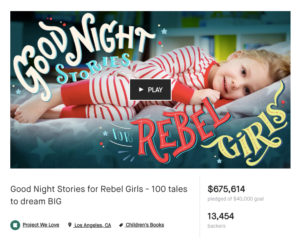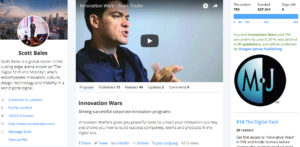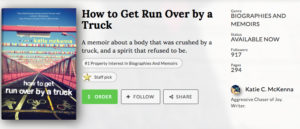PUBLISHED MARCH/APRIL 2019
by Tian Daphne, Community Manager for Publishizer --

Tian Daphne
Harnessing the power of the crowd using the internet creates a win-win situation for publishers and authors alike.
Storytelling is a quintessential feature of human existence. As many as 19 other types of extinct early human species have been discovered so far, but we are the only survivors from the homo genus. Though weaker and less advanced, our ancestors had the ultimate survival strategy: a strong affinity for shared mythologies that strengthened alliances in difficult times. Yet, despite the many changes that technological innovations have wrought, our deep love of stories prevails.
History of Books and Publishing
The earliest surviving books in the forms of clay tablets from Mesopotamia and papyrus rolls from Egypt date back to early third millennium BC. Books have taken on many forms since, made from wood or bamboo, written on leaves, vellum or parchment. In the past, book ownership was not widespread, enjoyed only by the elite upper classes of society.
With the mechanization of the printing press in 1450, the rise of literacy and the relaxation of restrictive censorship laws, books finally became affordable and accessible, influencing minds and societies. Today, electronic and communications technology continues to change the way we interact with books.
Writing a book is only the tip of the publishing iceberg. There are many roads to becoming a published author in a landscape that proves confusing for most. An increasingly fragmented market, lower costs in publishing and distribution, and new ways to reach a digital audience have resulted in the democratization of publishing. This diversity encouraged the specialization and proliferation of the independent publisher, creating new avenues to publication.
The Rise of the Independent Publisher
Traditional publishing remains the Holy Grail for many hopeful authors. Despite a high rejection rate and many barriers to entry, traditional publishers still hold the most clout in the industry, churning out bestsellers and books that win prestigious literary awards. They have in-house teams and established distribution networks to work on book production and promotion. However, it also offers the worst deal for the authors.
Though self-publishing used to be scorned, today it is a thriving sector of the industry rapidly taken over in the online space. It keeps getting easier for anybody to self-publish their writing and put it out there, but many self-published authors struggle with producing quality work, discovery and distribution, or finding a reputable company to work with. Hybrid publishers emerged as a flexible middle ground between the two, gaining popularity in more recent times. What constitutes as hybrid publishing encompasses various models, though authors generally retain more control and better terms for their rights and royalties. As the costs of publication are usually shared between hybrid publishers and authors, crowdfunding proves to be an ideal complement.
A Brief History of Crowdfunding Books
Crowdfunding for books has been around a long time, with the first recorded instance of Alexander Pope thanking 750 backers for their support in translating Homer's
The Iliad to English in 1713. Just as early humans evolved to cooperate and find strength in numbers, we can now easily foster connections, strengthen ties, and grow online communities in an unprecedented way. Crowdfunding in the digital age has changed the way businesses and creative projects are financed. As the average advance and support given to authors continue to shrink, crowdfunding continues to grow as an inclusive and viable alternative to get published.
Why Is Crowdfunding Relevant for Publishers?
Crowdfunding is a powerful tool for authors, and it also offers value for publishers, as well. Publishers are able to identify books and authors with high sales potential in order to make more profitable acquisitions. Valuable data is gathered during the campaigns, as well as email lists to promote the author's future books. Additionally, the social aspect of crowdfunding translates to free, organic promotions with a high degree of exposure to readers.
Beyond the numbers of copies printed and sold, and the novels that drew the longest waiting lists, hardly any data is collected on the readers. Amazon possesses huge amounts of data on their readers but does not share this with publishers or authors. Data collected from crowdfunding campaigns can allow authors and publishers to spot trends, analyze profiles of their readers, drive social engagement, and grow committed readerships.
Publishing is a complex business that most crowdfunding platforms do not get involved in, but harnessing the power of the crowd using the internet creates a win-win situation for all parties involved. Here are three of the most successful book campaigns on different crowdfunding platforms.
1. Kickstarter: the world's largest funding platform for creative projects.
 Timbuktu Labs raised $675,614 for their book
Timbuktu Labs raised $675,614 for their book Goodnight Stories for Rebel Girls.
was Kickstarter's first and biggest publishing project for an original work*—a children's book that showcases the true stories of 100 inspiring women, illustrated by female artists from around the world. It raised more than $600,000, with almost 20,000 backers from 71 countries. The founders went on to crowdfund
Goodnight Stories for Rebel Girls 2, smashing their previous record with almost $900,000 raised. Though originally "unimpressed with their experience with traditional publishing," their crowdfunding success secured them a publishing contract with Penguin Random House.
*Bibliotecha raised more than $1.4 million for a new edition of the Bible in 2014.
2. Publishizer: the world's first crowdfunding literary agency.
 Author Scott Bales amassed $27,344 on Publishizer for his second crowd-funded book after successfully raising $29,230 for his first book on the site.
Author Scott Bales amassed $27,344 on Publishizer for his second crowd-funded book after successfully raising $29,230 for his first book on the site.
First-time author Scott Bales raised almost $30,000 for his first book,
Mobile Ready: Connecting with the Untethered Customer on Publishizer. Two years later, his second campaign raised almost $28,000.
Innovation Wars: Driving Successful Corporate Innovation Programs received offers from 31 publishers and was eventually signed to Morgan James Publishing in New York City. His two bestselling books have firmly cemented his position as a global leader in the cutting-edge arena known as "the digital shift and mobility," which encompasses innovation, culture, design, technology, and mobility in a world gone digital. Bales is preparing to launch his third book,
Are You Ready for Isaac?, using crowdfunding.
3. Inkshares: a publishing and literary rights-management platform founded in 2013. Readers decide what they publish.
 After facing rejection from the traditional publishing industry, author Katie McKenna raised $14,203 on Inkshare for her memoir.
After facing rejection from the traditional publishing industry, author Katie McKenna raised $14,203 on Inkshare for her memoir.
After getting run over by a truck—and surviving—Katie McKenna went on to write about her experience. She was met with years of rejections from traditional publishers who told her that her writing was not good enough. Yet she managed to fully fund her Inkshares campaign in just three days, and raised more than $14,000. Inkshares published her memoir
How to Get Run Over by a Truck.
In all three case studies above, authors were able to access and activate an online community to garner support for their campaigns, prove the genuine demand for their books, and attract the right type of publisher for their books.
The Emergence of Book ICOs
Neither storytelling nor books are going to become obsolete. The future looks exciting with the recent appearance of blockchain technology in the publishing industry, which could revolutionize how books are funded, acquired, and distributed; how rights are traded and tracked; and how royalties are calculated and paid out.
Publica offers a book ICO platform that allows authors to sell pre-orders of their upcoming works as readable tokens, and has even partnered up with Morgan James Publishing. Despite the impression that the publishing industry is archaic and resistant to change, technology has already compelled its evolution.
The next five years will see increased crowdfunding activity for books, experimentation with book ICOs, and new marketplaces serving publishing professionals. Crowdfunding will continue to be a useful and relevant source for independent publishers to discover new bestselling titles quickly at much lower risk. As readers become increasingly involved with the selection and marketing of new titles, publishers that can respond to changing market conditions and appeal to targeted author segments will be able to increase the quality and quantity of their front-list titles. The independent publisher that can identify and address underserved niches will be poised for commercial success in the storytelling economy.
Tian Daphne is the community manager for Publishizer and a voracious reader. She organizes book proposal writing contests, as well as events like "Startup Writer Workshop," "Dawn Dose," and "Writing Under the Influence" around the world. She also writes for Publishizer's medium channel, which you can visit here.
Learn more about this topic: